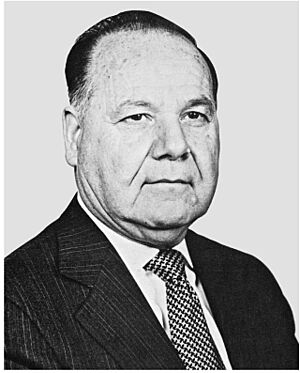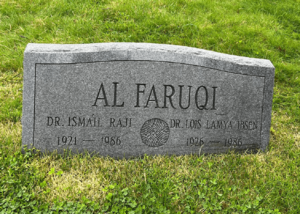Ismail al-Faruqi facts for kids
Quick facts for kids
Ismaʻīl Rājī al-Fārūqī
|
|
|---|---|
| إسماعيل راجي الفاروقي | |
 |
|
| Born | 1 January 1921 Jaffa, Palestine
|
| Died | 27 May 1986 (aged 65) Wyncote, Pennsylvania, United States
|
| Cause of death | Murder by stabbing |
| Resting place | Forest Hills Cemetery, Pennsylvania |
| Nationality | Palestinian-American |
| Alma mater |
|
| Era | Contemporary Islamic philosophy, 20th-century philosophy |
|
Notable work
|
Christian Ethics: A Historical and Systematic Analysis of its Dominant Ideas (1962), Islam and The Problem of Israel (1980), Al-Tawhid: Its Implications for Thought and Life (1982), Cultural Atlas of Islam (co-authored with Lois Lamya al-Faruqi, 1986) |
| Spouse(s) |
Lois Lamya al-Faruqi
(m. 1951; |
| Children | 3 |
| Scientific career | |
| Institutions |
|
| Theses |
|
| Doctoral students | John Esposito |
| Signature | |
 |
|
Ismaʻīl Rājī al-Fārūqī (إسماعيل راجي الفاروقي; January 1, 1921 – May 27, 1986) was an important Palestinian-American thinker. He was known for his work in Islamic studies and for helping different religions talk to each other. He studied at Al-Azhar University in Cairo, Egypt. He also taught at universities in North America, like McGill University in Montreal, Canada.
Al-Faruqi was a Professor of Religion at Temple University. There, he started and led the Islamic Studies program. He also created the International Institute of Islamic Thought (IIIT). Al-Faruqi wrote more than 100 articles and 25 books. Some of his famous books include Christian Ethics and Al-Tawhid: Its Implications For Thought And Life.
Contents
Early Life and Learning
Ismaʻīl al-Faruqi was born in Jaffa, a city in Palestine, which was then under British rule. His father, 'Abd al-Huda al-Faruqi, was an Islamic judge, called a qadi. Al-Faruqi learned about religion at home and in his local mosque. In 1936, he started going to the French Dominican Collège des Frères de Jaffa.
In 1942, he worked for the British government in Jerusalem. He helped set up cooperative groups. By 1945, he became the district governor of Galilee. After the 1948 Arab-Israeli War, al-Faruqi moved to Beirut, Lebanon. There, he studied at the American University of Beirut.
He then went to Indiana University in the United States. In 1949, he earned his Master's degree in philosophy. His thesis looked at the ideas of philosophers Immanuel Kant and Friedrich Nietzsche. He earned a second Master's degree from Harvard University in 1951. In 1952, he received his Ph.D. from Indiana University. His Ph.D. thesis was about how we understand what is good.
After his studies, he felt he needed to learn more about Islam. So, he went to Al-Azhar University in Egypt. This helped him connect his studies with his Islamic identity.
Teaching and Research
In 1958, al-Faruqi became a visiting scholar at McGill University in Canada. He taught at McGill's Institute of Islamic Studies. He was known for his fresh ideas about Islamic thought. During this time, he also studied Christian and Jewish beliefs.
From 1961 to 1963, he was a visiting professor in Karachi, Pakistan. This helped him learn about different Muslim cultures. In 1964, Al-Faruqi returned to the United States. He taught at the University of Chicago and Syracuse University.
In 1968, he joined Temple University as a professor of religion. He started the Islamic Studies Program there. He stayed at Temple University until he passed away in 1986. He also guided many students, including John Esposito.
In 1977, al-Faruqi helped organize the First World Conference on Muslim Education in Makkah. This meeting helped create Islamic universities in places like Dhaka, Islamabad, and Kuala Lumpur. Al-Faruqi was key in planning these new schools.
His Ideas and Beliefs
Early Ideas: Arab Identity
At first, al-Faruqi focused on urubah, which means Arab identity. He thought that Arab culture and values connected all Muslims. He believed that Arabic, the language of the Qur'an, was very important for understanding Islam. He wrote about these ideas in his book, 'Urubah and Religion.
Al-Faruqi also stressed tawhid, meaning the oneness of God. He saw this idea in Judaism, Christianity, and Islam. He thought Islam and monotheism were gifts from Arab culture to the world. Some scholars did not agree with his strong focus on Arab identity.
Shift to Islamic Identity
Al-Faruqi's ideas changed after he moved to the United States. He met many Muslim students from different backgrounds. This made him think more about a wider Islamic identity, rather than just Arab nationalism. He said, "Now I am a Muslim who happens to be an Arab from Palestine."
This change also came from his talks with people of other faiths. He saw that a united Islamic identity was important for good conversations with non-Muslims.
Views on God's Oneness
Ismail Raji al-Faruqi believed that tawhid (God's oneness) was very important. He thought that some mystical practices in Sufism could take away from the practical side of faith. He liked the ideas of thinkers who used reason and logic to understand Islam. He believed that tawhid meant using reason and acting ethically in all parts of life.
Connecting Religions
Al-Faruqi wanted to find common rules that could help people understand different religions. He hoped this would lead to better understanding and cooperation between faiths. He suggested that people should focus on ethical questions, like what is right and wrong, instead of just arguing about religious beliefs. He believed this could help bridge differences.
Islamization of Knowledge
Al-Faruqi worked hard on the idea of the Islamization of knowledge. This means combining Islamic principles with modern school subjects. He worried that modern education in Muslim countries was too separate from Islamic values. He felt this could lead to problems.
He believed it was important to mix Islamic ideas with modern sciences. He wanted to create school programs that taught both modern subjects and Islamic thought. This way, students could understand today's challenges from an Islamic point of view. His work led to the founding of the IIIT, which aims to develop Islamic ways of thinking for different fields of study.
Views on Zionism
Al-Faruqi was a strong critic of Zionism. He saw it as a political idea that did not fit with the Jewish religion. He believed that the problems caused by Zionism needed to be fixed. He suggested that Jewish people who gave up Zionism could live peacefully within the Muslim world.
His Achievements
In 1980, Ismail al-Faruqi helped start the International Institute of Islamic Thought (IIIT). He founded it with Taha Jabir Alalwani, Abdul Hamid AbuSulayman, and Anwar Ibrahim.
Al-Faruqi wrote many books and articles about Islamic studies. He wrote over 100 articles and 25 books. Some of his well-known books are Christian Ethics (1968), Islam and the Problem of Israel (1980), and Al-Tawhid: Its Implications For Thought And Life (1982). He also helped create the Islamic Studies Group of the American Academy of Religion.
He advised leaders in the Muslim world, like Muhammad Zia-ul-Haq in Pakistan. He also advised Mahathir Mohamad in Malaysia. He helped set up the International Islamic University in Islamabad in 1980. He also helped start the International Islamic University Malaysia (IIUM) in 1983. These universities aimed to combine religious and modern knowledge.
Al-Faruqi also worked to bring different religions together. He wanted to help people from different faiths understand and respect each other. He focused on what Islam, Christianity, and Judaism had in common.
Why His Ideas Still Matter
Al-Faruqi's ideas about combining Islamic knowledge with modern studies are still important today. Scholars and teachers still use his work to connect faith and reason. His writings are often mentioned in discussions about Islamic thought and education.
His efforts to promote understanding between different religions are also remembered. He helped create a more peaceful world by showing what Islam, Christianity, and Judaism share.
People in Montreal and around the world still recognize his important contributions to Islamic learning.
His Death
In May 1986, al-Faruqi and his wife were tragically killed at their home in Wyncote, Pennsylvania. Joseph Louis Young, also known as Yusuf Ali, confessed to the crime. He was sentenced to death and later died in prison in 1996. Their daughter, Anmar al-Zein, was also badly hurt but survived. People have suggested different reasons for the murders, including a robbery gone wrong or a politically motivated attack.
See also
- Lois Lamya al-Faruqi
 | Valerie Thomas |
 | Frederick McKinley Jones |
 | George Edward Alcorn Jr. |
 | Thomas Mensah |



